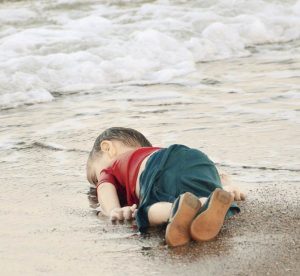Dear Reader,
I welcome you to the first blog post on this newly established page that breaks down lectures and course content in the ASTU 100 class at the University of British Columbia while analyzing their purpose in society.
To begin this post, I wanted to revisit the general theme of the “Sea Prayer” video by Khaled Hosseini (https://www.youtube.com/watch?v=LKBNEEY-c3s), and how its portrayal of the refugee crisis overseas allowed the viewers to truly connect themselves to a brutal reality that can often feel so distant and irrelevant to our own lives. Most importantly, I want to draw upon how the relatable tone, insightful dialogue and beautiful, raw imagery of the video was able to transport the audience into the small shoes of young Marwan, allowing us to receive meaningful knowledge in regards to the agonizing truth behind the story. The humanistic approach that Hosseini painted this harrowing picture with, brought a sense of empathy, understanding and compassion that is often neglected in our interpretations of foreign issues today.
 (Above: Body of Alan Kurdi, a Syrian toddler who sadly died as a refugee trying to flee his homeland (https://www.npr.org). The boat that Kurdi was on capsized on its way to the Greek Island of Kos. This famous image of Alan is known to be a key factor into why Hosseini made the “Sea Prayer” video).
(Above: Body of Alan Kurdi, a Syrian toddler who sadly died as a refugee trying to flee his homeland (https://www.npr.org). The boat that Kurdi was on capsized on its way to the Greek Island of Kos. This famous image of Alan is known to be a key factor into why Hosseini made the “Sea Prayer” video).
As the ASTU course content now shifts into topics such as the “War On Terror” and the bitter reality of being a soldier in a war overseas, a relevant analysis can be made if we dissect society’s modern image of a “soldier” and how this depiction can often be misconstrued. Due to the current, false representation of a soldier, there is a disconnect between the public opinion of the army and the actual role they play in the wars of today. As mentioned in class by Ms. Luger, in today’s society returning soldiers are perceived and acknowledged as heros when they come back home from a mission. As seen in the viral videos on the internet, returning soldiers are treasured by family members, schools, and the foundational institutions of society that influence public opinion. In the Western World, army members are praised for their great work overseas, given medals of honour and are treated with lifetime respect for their role in war. This general mentality of “us against them” ties into the overall perception of the west’s involvement in the Middle Eastern Wars, as “It was about Americans coming together to fight against the terrorists, the enemy, and “the other.” (Amy summarized during the Learning Groups, LP Report _2_ Sep24 editied.page). But as this blog post deliberately set out to question, are these traditional methods of decorating our returning soldiers justified, or is there another side of the story that needs to be told, in order to truly portray the humanistic reality of life at war? To skim the upper layer of a topic so vast, one can look at the immediate alienation of Middle Easterns during the 9/11 aftermath. A clear line in the sand was drawn between good and evil, with westerners strongly believing that their troops were firmly situated on the right side. In the first snippet of the book “Redeployment” (file:///Users/callumyoung44/Downloads/187261–redeployment–astu100g022021w1-21styearcapseminar–c%20(3).pdf), it’s quite obvious that our soldiers were not as angelic as the general public has grown to believe, through the viral videos and celebratory medals of honour, “We shot dogs. Not by accident. We did it on purpose, and we called it Operation Scooby.” (Page 1, of Redeployment by Phil Klay). Truthfully, war has left a grim stain on the complex history of humanity, and rarely involves completely good and completely bad sides. As this course further dives into the sickening intricacy of war and what horrors really occur out on the battlefield, Khaled Hosseini would hope for us all to use a lens of sympathy and understanding when delving into the reasoning behind the “War on Terror” and who the real enemy is. This isn’t a topic that can simply be solved by one answer, but if our society as a whole can initiate a period of deep reflection regarding the western world’s role in the destruction of the Middle East, the sooner peace agreements can be made to benefit both sides involved.
As ex-president of The United States, Barack Obama, once said:
“Learning to stand in somebody else’s shoes, to see through their eyes, that’s how peace begins. And it’s up to you to make that happen. Empathy is a quality of character that can change the world.”
